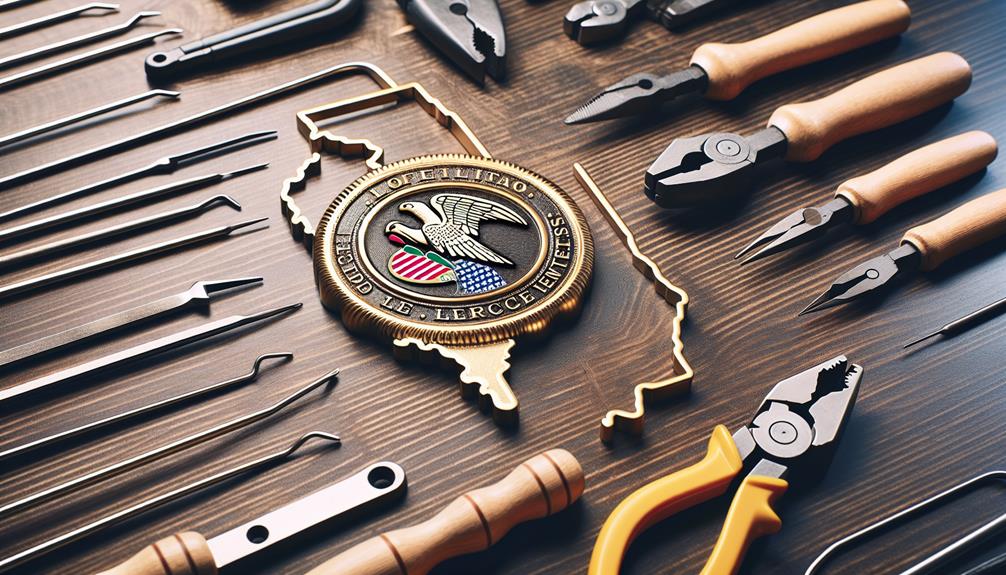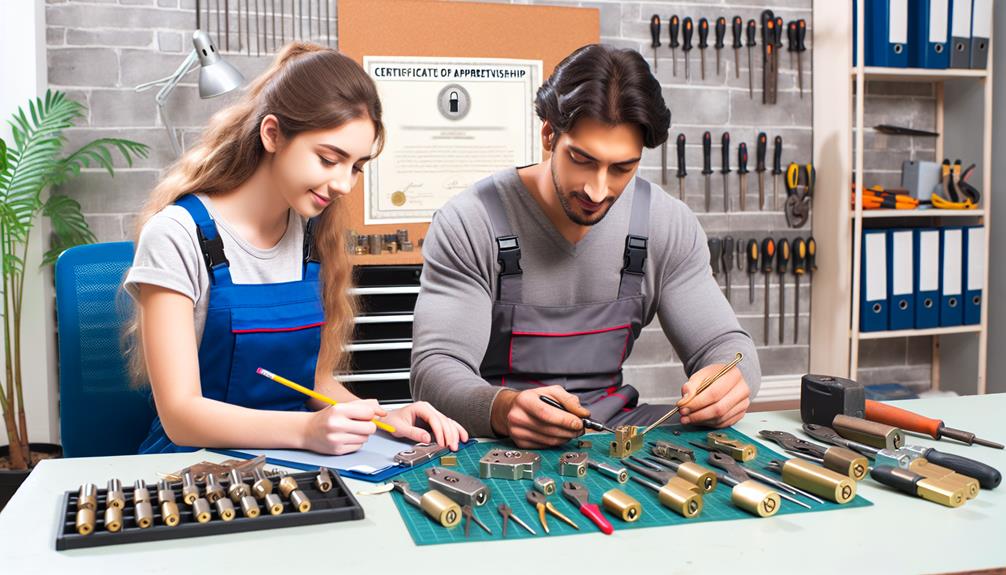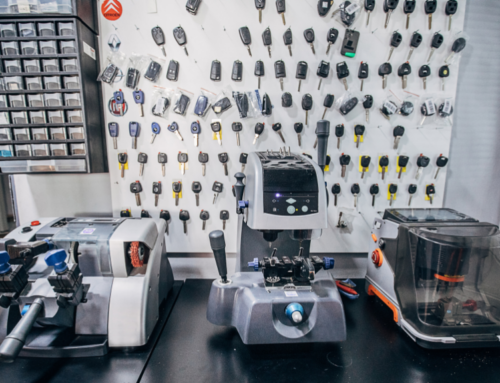As you stand at the threshold of a new career, the locksmithing profession in Illinois is like an intricate lock waiting for the right key—a key that you’re poised to forge with your own hands. You’re not just looking at picking up a set of tools; you’re considering a venture into a world where your skills could ensure security and peace of mind for countless individuals.
To start turning the tumblers on this journey, you’ll need to understand the specifics of licensing requirements, which include more than just a knack for mechanics and a steady hand. Training and apprenticeships will offer you the foundational knowledge and practical experience you need, and when it’s time to take the licensure examination, you’ll want to be as prepared as any master locksmith.
The potential earnings and job stability are enticing, but they come with the need for continuous learning and adaptation. As you contemplate the steps ahead, consider the benefits and challenges that come with the territory of this skilled trade. Are you ready to unlock the potential of a career in locksmithing?
Let’s examine the blueprint for success in this dynamic field.
Key Takeaways
- To become a locksmith in Illinois, you must meet certain requirements such as being at least 18 years old, having good moral character, passing a licensing exam, and undergoing a criminal background check.
- Finding a locksmith school in Illinois can be done by checking local directories, online directories, or considering apprenticeship under an experienced locksmith.
- Licensing requirements for locksmiths in Illinois include passing a qualifying examination and obtaining a valid license, which is required in cities like Chicago, Aurora, Joliet, etc.
- To obtain a locksmith license in Illinois, you need to apply with IDFPR, pass the qualifying examination, submit fingerprints for a background check, and obtain general liability insurance.
Licensing Requirements

To work as a locksmith in Illinois, you must obtain a valid license by meeting specific state-regulated criteria, including passing a licensing exam and a criminal background check. Navigating the licensing process demands your attention to detail and adherence to the established application requirements.
You’ll start by proving you’re at least 18 years old and demonstrate good moral character. The application mandates a fingerprint-based criminal history check to ensure you can be trusted with the security responsibilities inherent to the profession. You can’t overlook the importance of passing an authorized licensing exam, which assesses your knowledge and skills as a locksmith.
Once you’ve cleared these hurdles, you’ll need to pay the required fees. These are non-negotiable and cover the costs of processing your application and maintaining the licensing system. Remember, without a license, you’re not legally permitted to operate as a locksmith in cities like Chicago, Aurora, or Joliet.
Stay informed about any updates to the licensing requirements, as regulations can change. The Locksmith Act of 2004, for instance, is slated for repeal in 2029. Until then, keep your license active and comply with all renewal mandates to ensure your career isn’t interrupted by lapses in licensure.
Training and Apprenticeships

Embarking on a locksmith career in Illinois requires comprehensive training or an apprenticeship to master the necessary skills and techniques. You’ll find that both paths offer distinct advantages and can pave the way to numerous career opportunities in the locksmithing field.
Training programs typically provide a structured curriculum, including both theoretical and hands-on instruction. They may be offered by community colleges, vocational schools, or specialized locksmith training centers. These programs often culminate in certification, which can enhance your credibility and employability.
On the other hand, apprenticeships allow you to learn directly from experienced professionals in a real-world setting. You’ll gain practical knowledge and develop your skills on the job, an invaluable experience that can’t be replicated in a classroom.
Here’s a quick comparison of both pathways:
| Training Programs | Apprenticeships |
|---|---|
| Structured curriculum and formal instruction | On-the-job training with a mentor |
| May result in certification | Earn while you learn |
| Short-term commitment | Longer-term commitment with progressive skill development |
Advantages of apprenticeships include earning an income while learning and establishing direct connections within the industry, which can be crucial for future job prospects. As you consider your options, weigh each path’s benefits against your career goals and personal circumstances.
Locksmith Licensure Examination

While comprehensive training and apprenticeships provide the foundation for a locksmith’s skills, passing the Locksmith Licensure Examination is a crucial step in obtaining your official credentials in Illinois. You’ll need to navigate the fingerprinting process and manage the waiting period for exam results with patience and attention to detail.
Here’s what you need to know about the examination process:
- Application Submission: Start by applying for the examination through the Illinois Department of Financial and Professional Regulation (IDFPR). This step typically includes paying associated fees and completing the necessary paperwork.
- Fingerprinting Process: Schedule your fingerprinting appointment, which plays a part in the background check. The results of this process are critical to your eligibility for licensure.
- Examination Preparation: Prepare for the exam by reviewing the material covered in your training. A thorough understanding of locksmithing principles is imperative for success.
- Results and Follow-Up: After taking the exam, there’s a waiting period to receive your results. Once you pass, you’ll finalize your licensure by paying any remaining fees and providing proof of insurance, if applicable.
Navigating these steps with diligence ensures you’re on the right path to becoming a licensed locksmith in Illinois.
Salary and Employment

Understanding the potential earnings and job market for locksmiths in Illinois is essential as you consider this trade for your career. Several factors influence a locksmith’s salary, including geographic location, experience, and the level of expertise in various locksmithing areas. In Illinois, the salary range can vary, with many locksmiths earning a competitive wage as they gain experience and develop their skills.
Your income potential doesn’t stop there. Opportunities for career advancement are plentiful in the locksmith industry. You might start as an apprentice, but with dedication and continuous learning, you can progress to a master locksmith or even run your own successful business. Specializing in areas such as automotive, commercial, or security systems can also lead to increased earnings.
Tools and Resources

To excel as a locksmith in Illinois, you’ll need to arm yourself with a comprehensive set of tools and resources, ranging from basic lock-picking sets to advanced diagnostic equipment. Your toolkit should evolve with your expertise, especially if you delve into specialized areas like automotive locksmithing. Here’s what you should consider:
- Basic Locksmithing Tools: Every locksmith starts with a foundational set of picks, tension wrenches, and key turners. Precision is key, so choose quality over quantity.
- Advanced Diagnostic Gear: For modern challenges, you’ll want transponder programming devices and EEPROM readers. These specialized tools for automotive locksmiths are crucial for key replacement and ignition repair.
- Locksmith Associations: Joining a recognized locksmith association can provide you with ongoing education, networking opportunities, and the latest industry standards.
- Continued Learning Resources: Stay informed about the newest security technologies through webinars, workshops, and trade shows recommended by trusted locksmith associations.
As a skilled locksmith, your ability to adapt and update your toolbox is vital. Stay connected with the locksmith community and suppliers to ensure you have access to the latest tools and educational resources. Precision in both your craft and the tools you use will set you apart in the Illinois locksmith industry.
Frequently Asked Questions
What Are Some Common Challenges Faced by Locksmiths in Illinois, and How Can They Be Addressed?
Navigating the labyrinth of market competition, you’ll face hurdles as a locksmith in Illinois. To stay ahead, you need to embrace tool innovation, constantly updating your kit with the latest technology.
Tackling challenges like economic fluctuations and evolving security needs, you must remain informed and adaptable. Precise skills and a robust network can help you weather storms and keep your services in high demand.
Don’t let complacency lock down your potential.
How Does the Repeal of the Locksmith Act of 2004 in 2029 Affect Current and Aspiring Locksmiths in Illinois?
The repeal of the Locksmith Act in 2029 may cause some confusion for you, but it’s key to keep abreast of future regulations. Stay informed through professional associations and the IDFPR to ensure you’re compliant.
As laws evolve, your adaptability and proactive approach will be crucial in navigating the changing landscape of the locksmith profession in Illinois.
Stay ahead, and you’ll secure your career’s longevity.
What Are the Continuing Education Requirements for Locksmiths in Illinois to Maintain Their Licensure?
To maintain your locksmith license in Illinois, you’ll need to complete continuing education before renewal deadlines. Seek courses from approved educational providers; they’re crucial in staying up-to-date with industry standards and regulations.
Make sure you’re well-informed on the specifics – failing to comply can jeopardize your licensure. Track your progress and submit proof timely to avoid any lapse in your professional status.
How Can a Locksmith in Illinois Stay Updated With the Latest Security Technologies and Locksmithing Techniques?
To stay current, you should attend security expos and consume trade magazines. These resources provide insights into cutting-edge security technologies and locksmithing techniques. They’re invaluable for honing your skills and ensuring you’re at the forefront of industry advancements.
Keep learning; it’s essential for maintaining your edge as a locksmith. This proactive approach will enhance your expertise and service quality, keeping you competitive in a rapidly evolving field.
Yes, mentorship programs are available for you as a newly licensed locksmith in Illinois.
These programs offer immense benefits, including one-on-one guidance from experienced professionals, skill enhancement, and business networking opportunities.
They’re designed to help you smoothly transition into your locksmith career and can be found through local locksmith associations or by reaching out to established locksmiths who may be open to mentoring.

